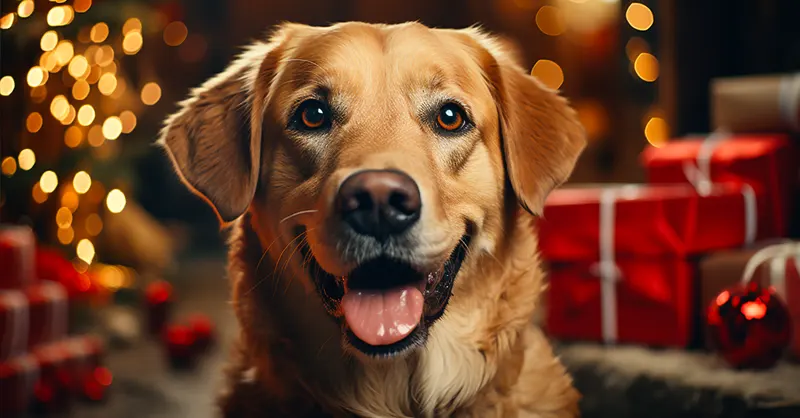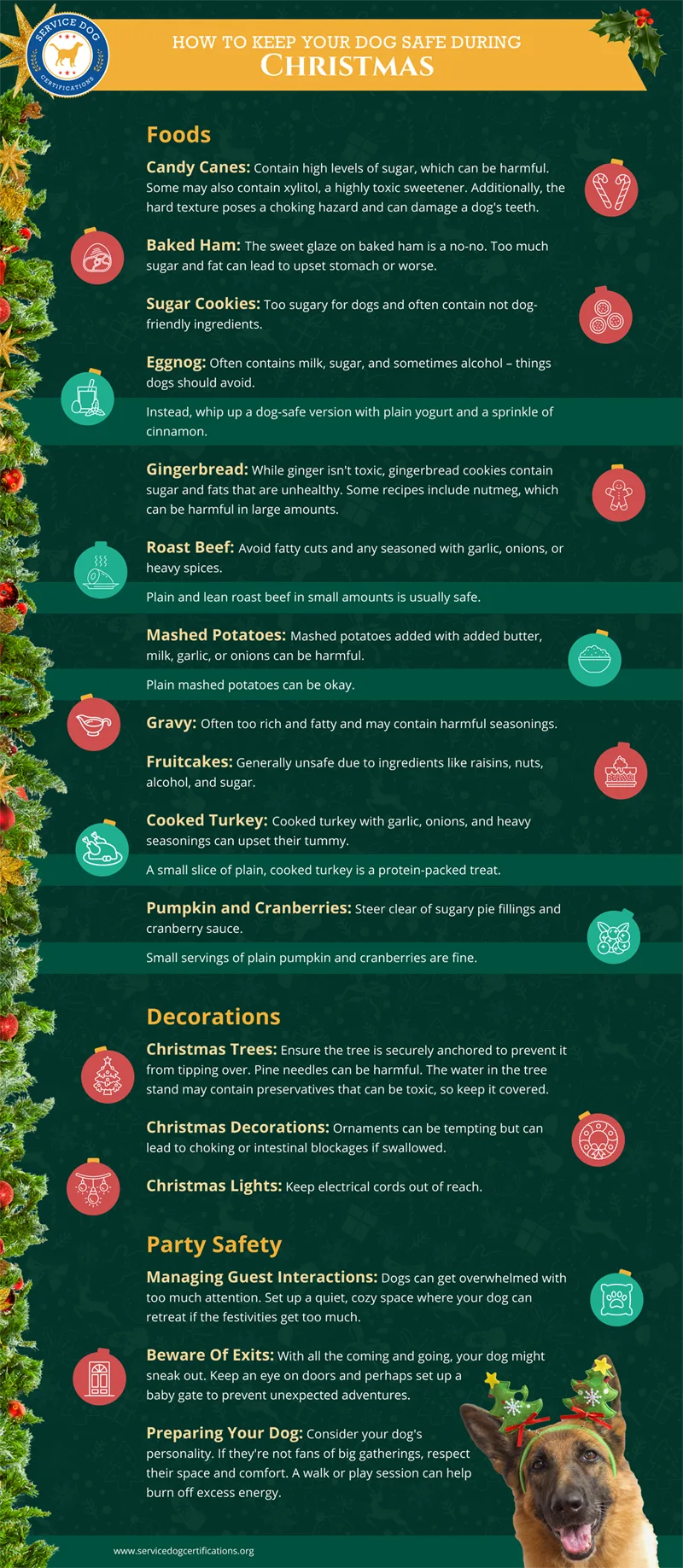Home Page › Blog › How to Keep Your Dog Safe During Christmas
How to Keep Your Dog Safe During Christmas

Hello, dear pet parents! Christmas is a wonderful time to celebrate with our furry family members. But amidst the cheer and festivities, it’s crucial to keep our four-legged friends safe. Let’s explore how to make this holiday season delightful and secure for your pooch.
Pet-Safe Christmas Foods
During the holidays, there is always an abundance of delicious food around. Be mindful of the foods that your dog has access to. Here are some common holiday foods:
- Candy Canes: Candy canes often contain high levels of sugar, which can be harmful to dogs, potentially leading to obesity and dental problems. Some candy canes may also contain xylitol, a highly toxic sweetener to dogs. Additionally, the hard texture of candy canes poses a choking hazard and can damage a dog’s teeth.
- Baked Ham: That sweet glaze on baked ham is a no-no for pooches. Too much sugar and fat could lead to an upset stomach or worse. Stick to their regular treats, even if those puppy eyes are convincing!
- Sugar Cookies: These are too sugary for dogs and often contain ingredients that aren’t dog-friendly. Plus, those cute shapes are more fun for humans than for doggie diets.
- Eggnog: This holiday favorite often contains milk, sugar, and sometimes alcohol – all things that dogs should avoid. Instead, maybe whip up a dog-safe version with plain yogurt and a sprinkle of cinnamon.
- Gingerbread: While ginger isn’t toxic to dogs, gingerbread cookies contain sugar and fats that are unhealthy for them. Not to mention, some recipes include nutmeg, which can be harmful to dogs in large amounts.
- Roast Beef: Plain and lean roast beef in small amounts is usually safe. Avoid fatty cuts and any seasoned with garlic, onions, or heavy spices.
- Mashed Potatoes: Plain mashed potatoes without added butter, milk, garlic, or onions can be okay. However, these additions, common in holiday recipes, can be harmful to dogs.
- Gravy: It’s often too rich and fatty for dogs and may contain harmful seasonings. Best to avoid.
- Fruitcakes: Generally unsafe due to ingredients like raisins, nuts, alcohol, and sugar. These can be toxic or cause health issues in dogs.
- Cooked Turkey: A small slice of plain, cooked turkey is a protein-packed treat. Just be sure it’s free from garlic, onions, and heavy seasonings, which can upset their tummy.
- Pumpkin and Cranberries: Small servings of plain pumpkin and cranberries are fine, but steer clear of sugary pie fillings and cranberry sauce.
Share this image on your site
Christmas Trees
Ensure the tree is securely anchored to prevent it from tipping over if your dog bumps into it or tries to climb it. Pine needles, if ingested, can be harmful, so it’s a good idea to vacuum them regularly. Additionally, the water in the tree stand may contain preservatives that can be toxic to dogs, so keep it covered.
Christmas Lights
Keep electrical cords from lights out of reach, as chewing on them can lead to electric shock. Also, be mindful of ornaments and lights at the lower levels of the tree, which could be within your dog’s reach. Those shiny baubles and tinsel can be tempting for a curious snout but can lead to choking or intestinal blockages if swallowed.
Overall, regular monitoring and preventive measures can help ensure your dog’s safety around these holiday decorations.
Managing Guest Interactions
Dogs can get overwhelmed with too much attention. Set up a quiet, cozy space where your dog can retreat if the festivities get too much.
With all the coming and going, your dog might sneak out. Keep an eye on doors and perhaps set up a baby gate to prevent unexpected adventures.
Preparing Your Dog
Consider your dog’s personality. If they’re not fans of big gatherings, respect their space and comfort. A good walk or play session before guests arrive can help burn off excess energy.
Have a special, quiet place for them to retreat to, like a bedroom or a crate with their favorite toys.
Conclusion
With these tips, you can ensure a safe, happy Christmas for your beloved pup. Remember, the best gift you can give them is your love and protection. Happy holidays!
About the Author: The writing team at Service Dog Certifications is made up of folks who really know their stuff when it comes to disability laws and assistance animals. Many of our writers and editors have service dogs themselves and share insights from their own experiences. All of us have a passion for disability rights and animals.
Latest Posts

How to Bring a Service Dog to Disneyland
Trained service dogs are more than welcome to join their handlers at Disneyland. In this guide, we’ll explain Disneyland’s policies and give practical advice for bringing a service dog to Disneyland for the first time. Disneyland’s Service Dog Policies The Magic Kingdom is happy to welcome trained service dogs across most park locations! They kindly […]

Read More

Can Dogs Eat Tomatoes?
Yes! Dogs can safely enjoy tomatoes, but there are a few risks to be aware of so you can feed your dog responsibly. Fully ripe tomatoes (without the stems and leaves) can actually have nutrients that are good for your pup. Tomatoes have chlorogenic acid, an antioxidant that can have anti-inflammatory effects in cells. They’re […]

Read More

Can a Primary Care Doctor Write an ESA Letter?
Your family doctor, also called a primary care physician (PCP), can write a letter recommending an emotional support animal. We’ll explain what legally gives them that ability and explore what better options might be available for you. Why are Physicians Able to Write an ESA Letter? To turn your pet into an emotional support animal, […]

Read More





